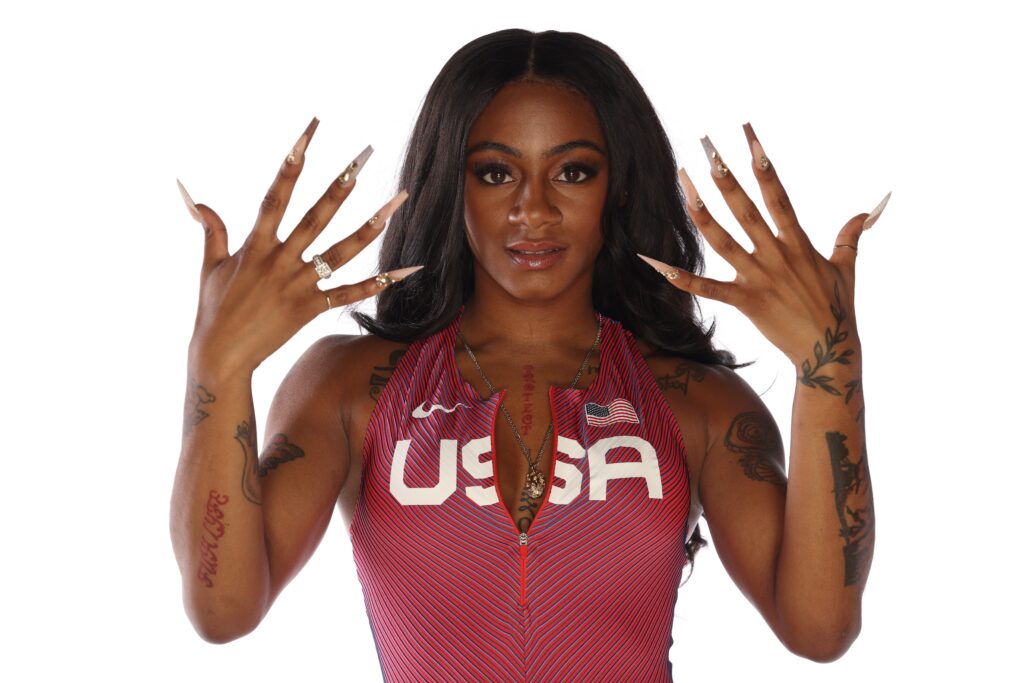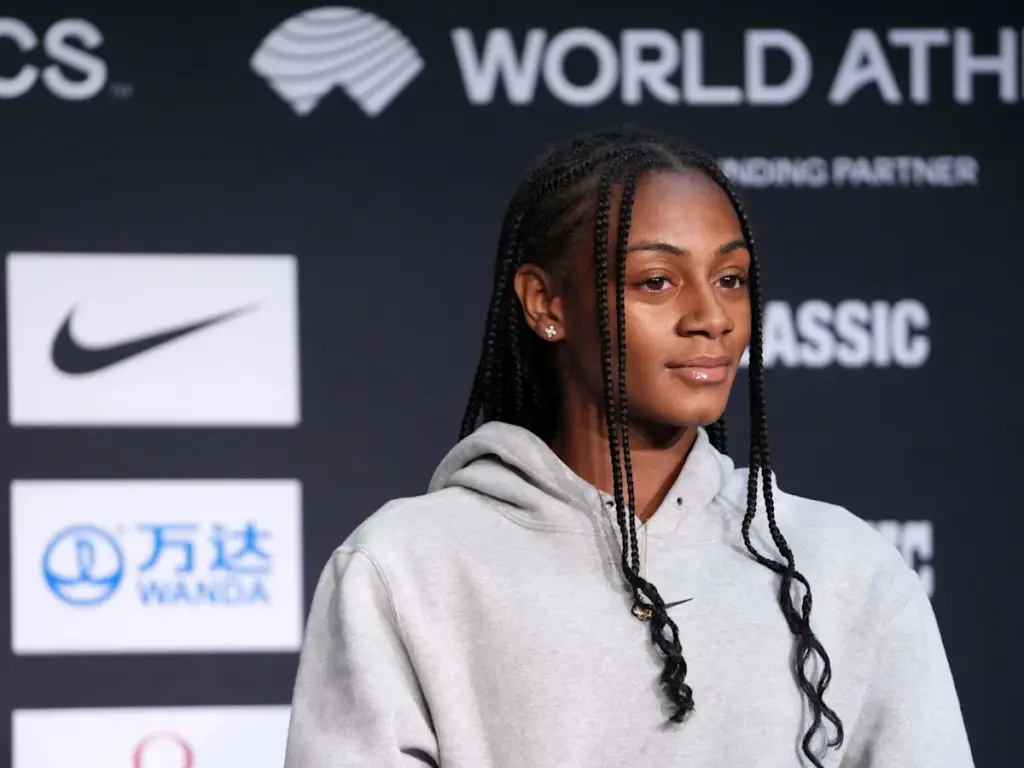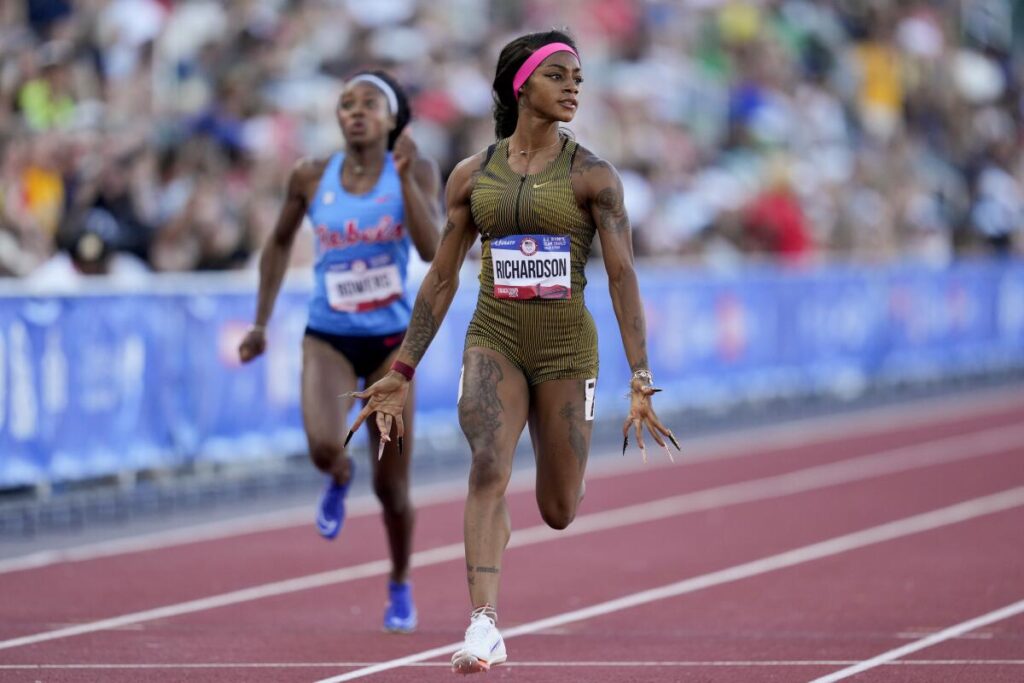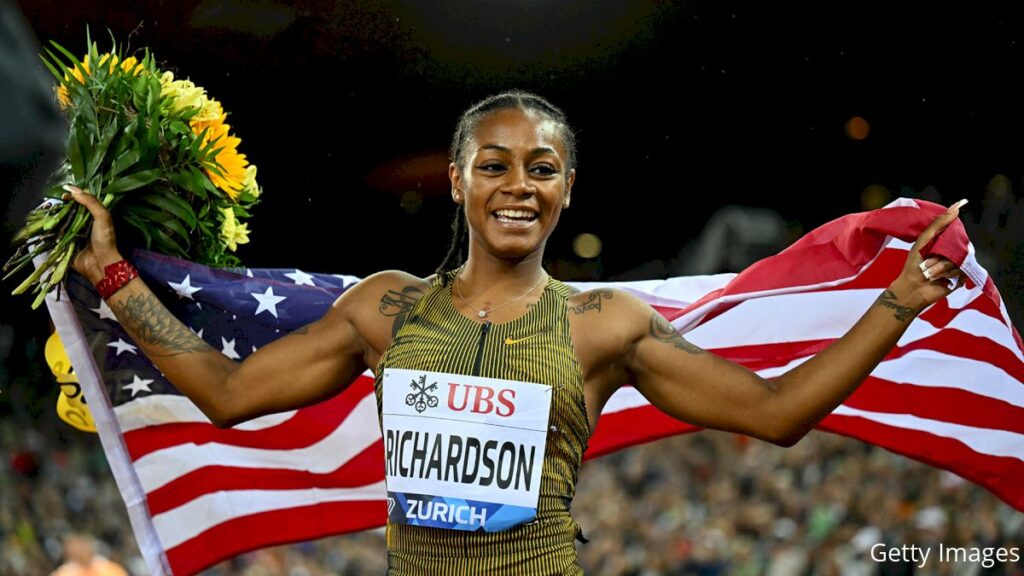Sha’Carri Richardson, one of the most recognizable names in American track and field, is back in the spotlight, but this time for reasons unrelated to her performances on the track. News broke that Richardson was arrested at Seattle-Tacoma International Airport following an alleged incident of domestic violence. The arrest has sparked widespread discussion about her personal struggles, her status as a public figure, and the challenges athletes face while navigating professional success alongside personal turmoil. This article will provide a detailed breakdown of the incident, Richardson’s career achievements and progression, the money and brand impact surrounding her case, her cultural influence, and the broader implications for athletes in the public eye.
The Incident at Seattle-Tacoma International Airport
On August 1, 2025, Sha’Carri Richardson was arrested at Seattle-Tacoma International Airport for alleged domestic violence, according to a police report. The details from the report describe an altercation between Richardson and a male companion shortly after they passed through airport security. Witnesses indicated that the verbal dispute escalated into physical aggression when Richardson allegedly pushed the man into a column and, according to additional footage from airport security, threw a pair of headphones at him.
The report further notes that the male companion was attempting to walk away from Richardson during the argument, but she reportedly continued to follow him before the altercation turned physical. Following her arrest, Richardson was booked at the South Correctional Entity in Des Moines, Washington, and was later released from custody the next day.
USA Track and Field, the governing body responsible for overseeing elite American athletes in the sport, has declined to comment on the matter. At the time of her arrest, Richardson was preparing to compete later in the weekend at the U.S. Track and Field Championships, where she had qualified for the semifinal in the 100-meter race but later withdrew. However, she announced her intention to participate in the 200-meter race the following Sunday.
While the legal proceedings are still unfolding, Richardson’s arrest raises concerns about how such incidents could influence her career trajectory, given her role as a high-profile athlete and a public figure.

💸 Money Angle / Wealth Perspective
As a global sports star, Sha’Carri Richardson has not only built a reputation on the track but has also developed a lucrative personal brand supported by endorsements and sponsorships. However, high-profile incidents off the field can have significant financial implications.
Effect on Endorsement Deals
Richardson’s appeal extends beyond the track, making her a sought-after figure for brands such as Nike and various private sponsors. Endorsement deals are often tied to an athlete’s public image, and off-field controversies can prompt companies to reassess these lucrative partnerships. In the past, companies have shown willingness to drop athletes whose conduct they view as misaligned with corporate values. For Richardson, the recent arrest raises the possibility of contract reviews or even terminations, especially as brands evaluate reputational risk in the lead-up to major events like the 2025 World Championships.
Marketability Ahead of 2025 World Championships
The run-up to the 2025 World Championships was expected to be a major opportunity for Richardson to boost her marketability, leveraging her success in the 2024 Paris Olympics and her electrifying personal brand. With the newly emerging controversy, her endorsement value may face heightened scrutiny. While her athletic prowess remains undiminished, sponsors may adopt a cautious approach, seeking assurances about her conduct and long-term reliability. The outcome of the legal proceedings will undoubtedly play a role in shaping her sponsorship landscape.

Comparison to Other Athletes
History is replete with cases where athletes’ personal conduct has directly impacted their earning potential. Tiger Woods’ public scandals resulted in a mass exodus of sponsors. Similarly, athletes like Hope Solo and Michael Phelps navigated sponsorship loss and brand rebuilding after legal or personal controversies. Some sponsors opt to stand by athletes during tough times, while others choose to pause or sever ties. Richardson’s situation fits in this broader context, demonstrating the delicate balance between personal conduct, public perception, and long-term wealth creation for high-profile athletes.
Legal Costs and Brand Risk Management
Legal challenges bring immediate financial burdens, from retaining high-profile legal counsel to covering potential settlements or court-ordered penalties. Moreover, athletes must dedicate resources to reputation management and strategic communications—crucial in mitigating negative publicity. Richardson’s team will likely focus on proactive brand risk management strategies: transparent communication, public accountability, and positive community engagement, all aimed at preserving both her earnings and fan base as the case unfolds.
📈 Career or Performance Background
Richardson’s journey from NCAA sensation to global track superstar has involved both incredible highlights and momentous setbacks:
NCAA Breakout at LSU
Her athletic journey gained national attention at Louisiana State University (LSU), where she became one of the fastest women in collegiate history. At the NCAA Championships, Richardson shattered records in the 100 meters and set collegiate bests, positioning herself as a rising star primed for international competition.
2021: Olympic Ban Due to THC
In 2021, Richardson’s path took an unexpected detour. After winning the 100 meters at the U.S. Olympic Trials in a dazzling display of speed, she was suspended due to testing positive for THC, the active compound in marijuana. This led to a highly publicized ban from the Tokyo Olympics, a major setback both professionally and emotionally as she missed what would have been her first Games.
2023: World 100m Champion
Richardson didn’t allow the 2021 disappointment to derail her ambitions. In 2023, she stormed back onto the world stage, capturing her first individual World Championship in the 100 meters with a blistering time of 10.65 seconds. This victory solidified her as the fastest woman in the world, helped reclaim her brand, and catapulted her into the elite ranks of global sprinters.
2024: Olympic Silver Medal and Relay Gold
Capitalizing on her world title momentum, Richardson had a standout season in 2024. At the Paris Olympics, she claimed a silver medal in the highly competitive 100-meter final. Additionally, her anchor leg on Team USA’s 4×100 relay squad helped secure an Olympic gold medal, reinforcing her comeback narrative and sustaining her public appeal.
Status: Qualified for 2025 Worlds
Despite withdrawing from events post-arrest, Richardson remains a qualified contender for the 2025 World Championships, thanks to her defending world champion status. While the legal proceedings have introduced uncertainty, her athletic credentials ensure she remains in contention, provided governing bodies and sponsors allow continued participation.

🌟 Brand, Influence & Culture Impact
Sha’Carri Richardson is more than a sprinter; she is a cultural icon and an outspoken individual whose image has sparked important discussions about race, gender, and modern celebrity.
Image as a Bold, Unapologetic Black Female Athlete
Richardson’s self-expression shines in everything from her brightly colored hair and tattoos to her confident interviews and social media presence. She embodies the ethos of being unapologetically herself, challenging conventional expectations of how Black female athletes should present themselves and conduct their careers. This approach has built a loyal fan following and made her a lightning rod in conversations about authenticity, individualism, and representation.
Public Perception: Expression vs. Controversy
With freedom of expression comes public scrutiny, especially when controversies arise. Supporters celebrate her outspokenness and resilience, viewing her as a role model who breaks barriers. Critics, however, sometimes interpret her assertiveness and high-profile missteps as evidence of a pattern of controversy. This tension between personal freedom and public expectation is a defining theme in the polling, commentary, and think pieces that surround her career.
Social Media Reactions and Narrative Shifts
Social media is a primary battleground for the shaping of Richardson’s public narrative. Responses to her arrest reflect divides along lines of gender, race, and beliefs about accountability. Some argue she is unfairly targeted due to her identity, while others focus on the gravity of the alleged incident. Hashtags, viral posts, and influencer commentary can quickly swing public opinion, influencing everything from sponsorship decisions to media framing of her story.
Relationship with Fans and Critics Post-Incident
In the wake of her arrest, Richardson’s supporters have called for understanding and empathy, emphasizing the mental health toll of elite athletics and constant scrutiny. Critics point to the need for personal responsibility and better decision-making by public figures. How Richardson manages this duality—addressing her actions while staying true to her identity—may shape her relationship with fans and the broader public going forward.

Richardson’s arrest is part of a growing conversation about the myriad challenges faced by athletes and public figures who live under constant scrutiny. While their achievements are highly celebrated, their personal lives are often magnified in ways that can lead to disproportionate criticism and pressure.
Athletes today are not just competitors; they are also role models, media personalities, and brand ambassadors. With these roles come immense expectations, and any misstep—perceived or real—can have significant repercussions on their careers. Incidents like Richardson’s highlight the need for additional support systems for athletes, including accessible mental health resources and mentorship programs designed to help them manage life off the field.
For public figures in general, this case raises questions about how society should balance accountability with compassion. While it is important to hold individuals responsible for their actions, it is equally important to recognize the human component and the challenges they may face in private.
Final Thoughts
Sha’Carri Richardson’s recent arrest at Seattle-Tacoma International Airport is a deeply complex issue that goes far beyond headlines. It involves questions of personal accountability, financial and career ramifications, cultural identity, and the broader responsibilities of athletes and public figures. Richardson, who has already exhibited incredible resilience and dedication in her athletic career, now faces perhaps her most significant challenge yet—navigating the fallout from this incident while preserving her place in the sport she loves.
What lies ahead for Richardson remains uncertain, but one thing is clear—this moment serves as yet another reminder of the pressures and vulnerabilities that come with living in the public eye. Whether she emerges from this situation stronger or faces additional obstacles, her story continues to be emblematic of the intersection between talent, scrutiny, wealth, and the complexities of modern fame.

